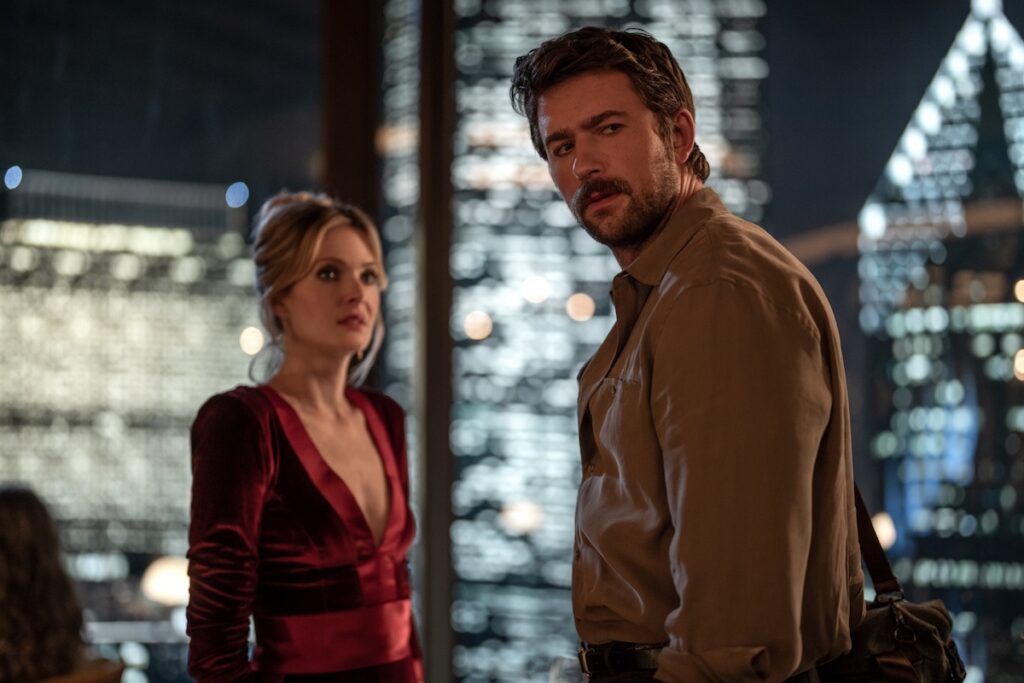‘Drop’ Promises a Thrilling Time at the Movies, and It Delivers
Taut and more than a little fun despite a sadistic premise, the movie is sure to be another success for Blumhouse Productions, the company mostly known for its popular horror pictures.

If the mark of a good popcorn movie is a measurable amount of popped kernels agitated onto the floor, then the new thriller “Drop” meets the requirement. For though I wasn’t eating during a preview screening, I did jump and squirm in my seat a couple of times while the story of a woman on a tortured first date unspooled.
Taut and more than a little fun despite the sadistic premise, the movie is sure to be another success for Blumhouse Productions, the company mostly known for its popular horror pictures such as “Get Out,” “M3GAN,” “Paranormal Activity,” and “Insidious.”
In some ways, “Drop” could be considered horror as well, especially its traumatic prologue scene, though its woman-in-danger premise and real-world plot mechanics belong to the thriller genre. Our heroine is Violet (Meghann Fahy), a widowed therapist who lives at Chicago with her young son Toby.
The young woman hasn’t been on a date in a long time, but she will finally meet Henry (Brandon Sklenar), a photographer she’s connected with online. Violet’s younger sister Jen (Violett Beane) arrives to babysit and even doles out a bit of advice to her older sister, who is anxious about the date and worried about getting into another abusive relationship.

Director Christopher Landon has Violet at an upscale restaurant at the top of a high-rise building in less time than it takes to say “Hitchcockian.” This establishment will be the setting for most of the film’s runtime, and the production design and art direction suggest both oddity and bland luxury, with a ribbed tunnel entrance, a circular bar, and a lighting scheme consisting of a bright center and a dark dining area.
The air of creepy impersonality extends to the patrons, many of whom are shown looking at their phones. When Violet appears in a red dress with a plunging neckline, though, most eyes turn to her. She quickly bonds with a female bartender, meets an older gentleman waiting for his blind date, and is even hit on by the boozing piano man.
Once Henry shows up and they’re seated at a table near the panoramic view, the movie moves into high gear, though it’s not because the two actors’ chemistry is particularly charged. Violet begins receiving discomfiting memes on her phone, via a program called “Digidrop” that uses short-range technology like Bluetooth to convey messages. Soon she realizes that there is an intruder in her house after she accesses her home’s security camera system. Further messages threaten the life of Jen and Toby should she call or text anyone or seek help from Henry or another person in the restaurant.
In addition to her phone being cloned and someone nearby sending her threatening messages, Violet discovers she’s being listened to through secret devices planted at her table and elsewhere while also being tracked around the restaurant via its security cameras. She is at the mercy of a techno-savvy sadist, and everyone she sees, including the prim maitre d’ and a skittish waiter, is a suspect. The tormentor orders her to smash the memory card in Henry’s camera, revealing a wider conspiracy, and she finds a way to complete this task. Then, when she’s told to kill her date, Violet’s resourcefulness and quick thinking are really put to the test.
After impressing with her supporting turn in the second season of HBO’s “The White Lotus,” the attractively normal Ms. Fahy here proves she can lead a major Hollywood movie. Her ability to maintain a demeanor of openness while dissimulating and to delineate small shifts in perception ties the audience’s sympathies to Violet’s every move. Plus, hints of steeliness in the actress become full-fledged facts when push literally comes to shove. As Henry, Mr. Sklenar signals receptivity to his date’s emotional state while emitting a certain ruggedness, though his messy mustache distracts.
Mr. Landon leverages multiple cinematic tools to visualize the cat-and-mouse maneuvers, including all-caps text overlaid onto scenes, spotlights, and Dutch angles. The efficient script by Jillian Jacobs and Chris Roach not only adds levity — watch for the “Baby Shark” song — but also moments of character development, as when Violet and Henry share a heart-to-heart regarding destructive relationships, bringing much-needed relief from the endless comings and goings to and from the table. Did they also intend to comment on the ever-corrupt nature of Chicago politics through Henry’s work for the mayor’s office? Maybe, though their biggest statement resides in pointing out the intersection between omnipresent technology and surveillance.
This being a Michael Bay-produced picture, one expects some action, and sure enough during and in between its two climaxes multiple objects get smashed, cars are crashed, and several bodies receive serious wounds. The excessive tone of the violence jars, though, particularly as the film up to this point had created a steady rhythm of tension and release with minimal brutality. Upon reflection, the airtight concept, too, reveals inconsistencies, though these never compromise one’s memory of overall enjoyment. “Drop” promises a good time at the movies and delivers.

